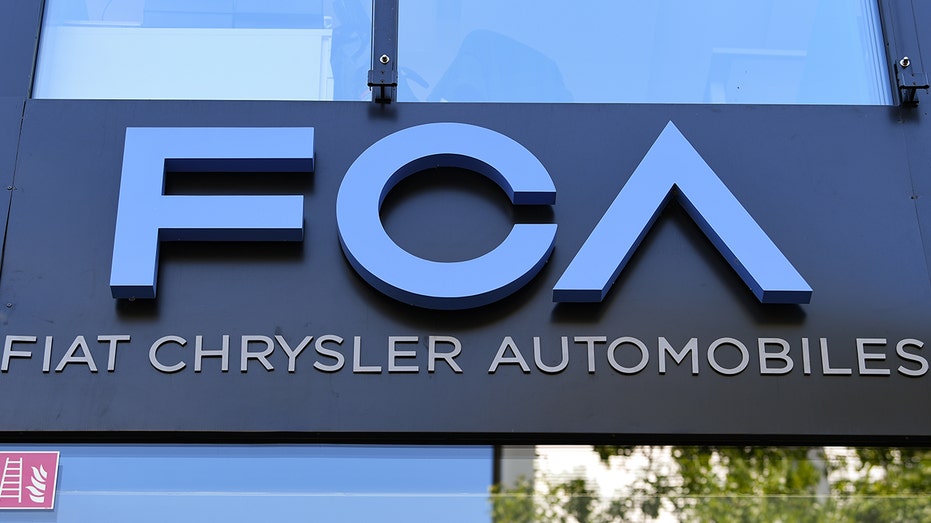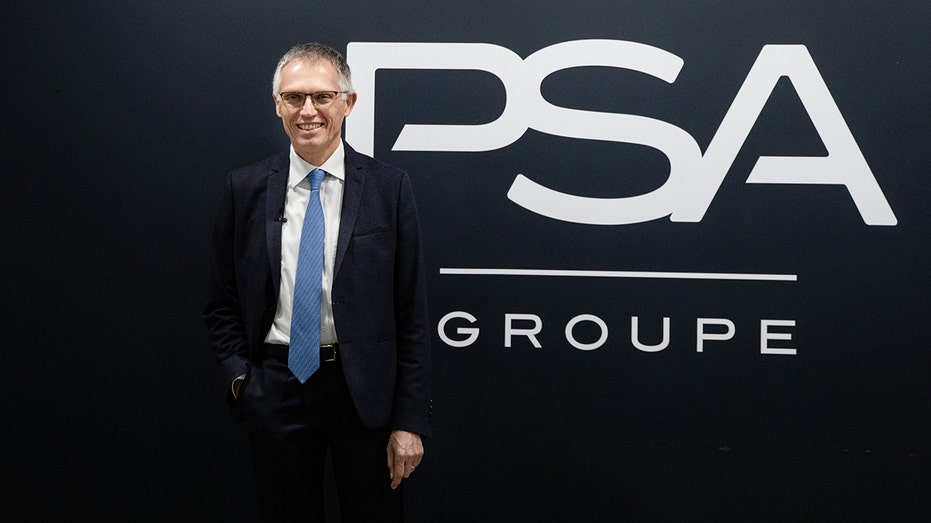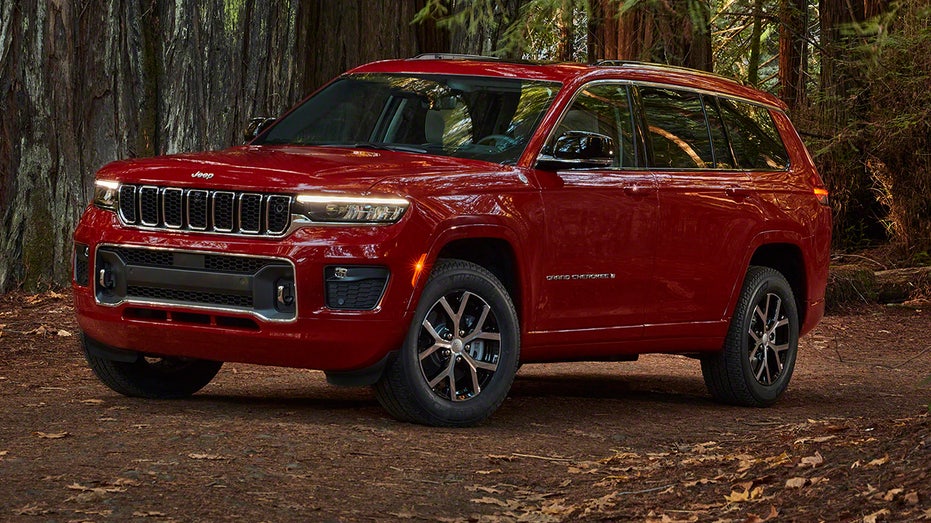Fox Business Flash top headlines are here. Check out what's clicking on FoxBusiness.com.
Fiat Chrysler Automobiles NV and Peugeot-maker PSA Group cemented their trans-Atlantic merger Saturday, creating Stellantis NV, a global auto-making giant that executives say will have the heft needed to compete in a fast-changing industry.
Continue Reading Below
The deal, first agreed to in late 2019 and approved earlier this month by shareholders, comes as the global car business is rapidly shifting to new technologies, such as electric vehicles, and battling upstarts trying to upend everything from the way cars are engineered and built to how they are sold.
Stellantis, derived from Latin term meaning " to brighten with stars," ranks as the world's third-largest auto maker by sales, according to 2019 figures, the latest available. At Friday's close, it was worth more than $51 billion. The newly formed car company plans to start trading under the ticker symbol STLA on the Paris and Milan stock exchanges Monday and in New York on Tuesday.
| Ticker | Security | Last | Change | Change % |
|---|---|---|---|---|
| FCAU | FIAT CHRYSLER AUTOMOBILES N.V. | 15.23 | -0.79 | -4.93% |
| STLA | n.a. | n.a. | n.a. | n.a. |
GM, GOLDMAN SACHS, MASTERCARD JOIN FORCES ON CREDIT CARD VENTURE
Stellantis will have a major presence in North America and more than a quarter of the market in Europe, selling vehicles through a massive collection of brands, ranging from American names like Jeep and Ram to Peugeot, Citroën and Opel in Europe and Maserati and Alfa Romeo on the luxury end.
In a turbulent year for many global manufacturers, executives at FCA and PSA pushed forward with the merger, saying the challenges posed by the Covid-19 pandemic have only reinforced the need for the combination. They estimate the tie-up could eventually produce $6 billion in annual cost savings, in part by consolidating the two companies' engineering and parts purchasing to drive larger economies of scale.
Still, the auto sector has a spotty record with megamergers and many of Stellantis's rivals, including General Motors Co., are moving in the opposite direction, retrenching from money-losing regions and shrinking their global operations to be more nimble.

Fiat Chrysler Automobiles NV and Peugeot-maker PSA Group cemented their trans-Atlantic merger Saturday, creating Stellantis NV, a global auto-making giant. (Photo by Arne Dedert/picture alliance via Getty Images)
FORD, TOYOTA, SUBARU CURB PRODUCTION AMID COMPUTER-CHIP SHORTAGE
Carlos Tavares, the PSA chief now leading Stellantis, faces numerous challenges in fitting these two companies together, including underperforming factories, lagging brands and an ailing China business.
"The trickiest part of every merger is when you have to mix all of the cultures," said Carla Bailo, president of the Center for Automotive Research and a former co-worker of Mr. Tavares at Nissan Motor Co.
The 62-year-old Mr. Tavares is known in automotive circles for his success in turning around faltering businesses. When he first arrived at Peugeot from Renault in 2013, the company was bleeding cash. Within six years, he transformed it into one of the most profitable European car companies with PSA posting an operating margin of 8.5% in 2019. He later revived Opel and Vauxhall, two once-struggling European brands that PSA purchased from GM in 2017.
At PSA, the turnaround was largely achieved by pulling back on profit-damaging sales discounts and pushing the company to be hypervigilant about costs. He also trimmed the workforce without closing plants, negotiating new union agreements and eliminating jobs through buyouts.

Carlos Tavares, the PSA chief now leading Stellantis, faces numerous challenges in fitting these two companies together, including underperforming factories, lagging brands and an ailing China business. (Marlene Awaad/Bloomberg via Getty Images)
SAFETY WATCHDOG SLAMS NHTSA’S NEW AUTONOMOUS CAR SAFETY REGULATIONS
It is a formula, some analysts say, he is likely to apply at Stellantis, which employs about 400,000 workers globally.
One of Mr. Tavares's largest undertakings will be melding the two auto makers' manufacturing operations, which together comprise nearly 50 factories globally -- many of them operating at well below capacity, according to data provided by research firm LMC Automotive. He also needs to reinvigorate the business in China, where the two companies' combined sales now account for less than 1% of a market that sold 20 million vehicles last year, and fix Fiat Chrysler's money-losing operations in Europe.
On electric vehicles, Stellantis will be under pressure to match the investment being poured into the technology by competitors, like GM, which plans to spend $27 billion through 2025 on electric and self-driving cars.
While Fiat Chrysler and PSA have worked to expand plug-in offerings and secure battery supplies, the marketplace is becoming increasingly competitive with both traditional car companies and well-funded startups getting ready to release a wave of new electric models this year.

The newly formed auto maker, called Stellantis, to start trading Monday in Europe and Tuesday in New York. (Jeep)
GET FOX BUSINESS ON THE GO BY CLICKING HERE
Stellantis plans to divert the bulk of the $6 billion in projected yearly savings to developing electric vehicles and other costly technologies. But first it must tackle areas of overlap in manufacturing and vehicle lineups, without closing plants and eliminating brands as executives have promised, a task that industry analysts say could be tricky as car companies continue to confront depressed sales during the pandemic.
Ms. Bailo says Mr. Tavares, a Portugese-born auto fanatic who spends many weekends racing cars, is likely to take time to assess the business and get to know his counterparts at Fiat Chrysler before making any major changes.
"He's not the kind of leader who gives you a target and says, 'Go find a way to meet it,'" she said. "He's much more hands-on than the typical leader."
Article From & Read More ( Fiat Chrysler, PSA Group merge to create new auto-making behemoth - Fox Business )https://ift.tt/3bSoMhY
Auto
Bagikan Berita Ini














0 Response to "Fiat Chrysler, PSA Group merge to create new auto-making behemoth - Fox Business"
Post a Comment